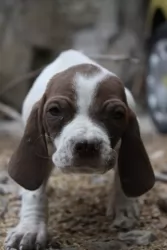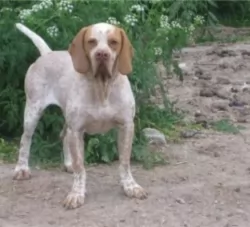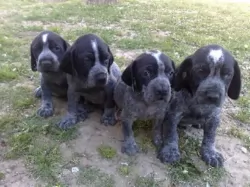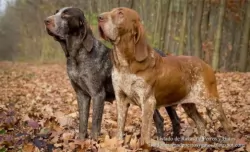 MyDogBreeds
MyDogBreeds Pachon Navarro is originated from Spain but Alaskan Husky is originated from United States. Both Pachon Navarro and Alaskan Husky are having almost same height. Pachon Navarro may weigh 8 kg / 18 pounds more than Alaskan Husky. Both Pachon Navarro and Alaskan Husky has same life span. Both Pachon Navarro and Alaskan Husky has same litter size. Both Pachon Navarro and Alaskan Husky requires Low maintenance.
Pachon Navarro is originated from Spain but Alaskan Husky is originated from United States. Both Pachon Navarro and Alaskan Husky are having almost same height. Pachon Navarro may weigh 8 kg / 18 pounds more than Alaskan Husky. Both Pachon Navarro and Alaskan Husky has same life span. Both Pachon Navarro and Alaskan Husky has same litter size. Both Pachon Navarro and Alaskan Husky requires Low maintenance.
 Known also as the Navarra Pointer, this is a Spanish hunting dog native to Navarre, Spain and descended from the extinct Old Spanish Pointer.
Known also as the Navarra Pointer, this is a Spanish hunting dog native to Navarre, Spain and descended from the extinct Old Spanish Pointer.
Major kennel clubs don’t recognize this dog as a standardized breed, but the Spanish Kennel Club has accepted the Pachón Navarro as a breed.
It is believed that this dog has also descended from other hounds as well as the Talbot hounds. It isn’t a new breed as it is thought that the dog originated in the 12th century already. There were times when the dog almost became extinct but efforts to preserve it have been made and to also establish it as a standardized breed.
 Alaskan Husky is created to be a working dog who can do many different jobs like hauling logs, transport, supplies delivery, racing dogs, etc. Mushers created this breed. Alaskan Husky is created as a mix of Inuit dog, Siberian Husky, Greyhound and German pointers, and it is very difficult to find pure breed Alaskan Husky, and they are not recognized by any Kennel club.
Alaskan Husky is created to be a working dog who can do many different jobs like hauling logs, transport, supplies delivery, racing dogs, etc. Mushers created this breed. Alaskan Husky is created as a mix of Inuit dog, Siberian Husky, Greyhound and German pointers, and it is very difficult to find pure breed Alaskan Husky, and they are not recognized by any Kennel club.
 This dog is large sized, standing at between 48 and 57cm in height and weighing between 27 and 33kg. A most unusual feature and characteristic unseen in dogs in general is his split or double nose. The nose of the dog serves the same purpose however, as with any other dog.
This dog is large sized, standing at between 48 and 57cm in height and weighing between 27 and 33kg. A most unusual feature and characteristic unseen in dogs in general is his split or double nose. The nose of the dog serves the same purpose however, as with any other dog.
The head is fairly large with a broad forehead. The broad head of the dog is generally solid colored. The coat of the coat of the dog is short and of a hard texture. Colors of the coat are white and brown or white and black or white and an orangey color with ticking.
The eyes are large and brown, the ears are long and broad with a rounded tip and the tail is long too. These dogs have a strong, sturdy body with strong legs.
The Pachon Navarro is a friendly, social, intelligent, loving and loyal dog. He is also gentle and docile with an amicable nature, making him a splendid choice for those with children in the home as well as pets.
He is athletic and energetic and is going to need a good dose of daily exercise. Apart from their strong hunting instincts, they make excellent family pets and companions and is most certainly not a dog to be put outdoors day after day without the contact of his human family.
He is intelligent and a quick learner and will benefit from training and socialization as this makes him obedient and it also bring about positive changes with any bad behavior from this excellent pet.
He requires a kind, firm, patient and consistent owner. This particular dog won’t be suited to living in a tiny property in the city, as they require a lot of space to run and exercise.
 Alaskan Husky average weight depends from dog to dog, but on average male weights 21-25kg, while their height is moderate size. Females are slightly smaller than males, and they can weight 17-19kg.
Alaskan Husky average weight depends from dog to dog, but on average male weights 21-25kg, while their height is moderate size. Females are slightly smaller than males, and they can weight 17-19kg.
A lifespan of Alaskan Husky depends, again, from dog to dog, but it is 10-15 years. Of course, if you are taking care of your dog, they can live much longer.
Litter Size of average female is 4-10 puppies.
 The Pachón Navarro is an active, friendly, playful, affectionate dog and he makes a great family pet. He will however want lots of outdoor exercise, making him a suitable companion for active owners. Inactive city dwellers should think of keeping a more docile kind of indoor pet.
The Pachón Navarro is an active, friendly, playful, affectionate dog and he makes a great family pet. He will however want lots of outdoor exercise, making him a suitable companion for active owners. Inactive city dwellers should think of keeping a more docile kind of indoor pet.
Your Pachón Navarro just loves the company of his human family and will be dejected if made to spend all his time outside and away from his owner.
He also takes his role as guardian and protector seriously. Give him what he requires and make him part of the family and he will be a most remarkable friend and companion.
 Alaskan Husky is the best dog for the active people or families. They are bred to be working dogs. This breed is not created for it looks or pedigree, but this breed is bred purely to help with various tasks. They love being around the family, and they are very happy and cheerful. Alaskan Husky is not good watchdogs because they love everyone, including strangers. They are highly intelligent breed, but it can be tricky to train them sometimes. You must be a leader who makes decisions because if you are not confident, they will not see the reason for listening to you. The best way of training your dog would be with patience and firm, decisive manner. The old-fashioned way of training that includes punishment is not recommendable. They do not respond well to that. Training with awards is the best way to teach your dog. Alaskan Husky is a very active dog, so they are not very good for apartments. Although, you can have them in apartments but only if they have active walks and exercises. They love jogging, and they can be excellent buddies in any activity. They will love all the animals but it is important for them to socialize from the early age.
Alaskan Husky is the best dog for the active people or families. They are bred to be working dogs. This breed is not created for it looks or pedigree, but this breed is bred purely to help with various tasks. They love being around the family, and they are very happy and cheerful. Alaskan Husky is not good watchdogs because they love everyone, including strangers. They are highly intelligent breed, but it can be tricky to train them sometimes. You must be a leader who makes decisions because if you are not confident, they will not see the reason for listening to you. The best way of training your dog would be with patience and firm, decisive manner. The old-fashioned way of training that includes punishment is not recommendable. They do not respond well to that. Training with awards is the best way to teach your dog. Alaskan Husky is a very active dog, so they are not very good for apartments. Although, you can have them in apartments but only if they have active walks and exercises. They love jogging, and they can be excellent buddies in any activity. They will love all the animals but it is important for them to socialize from the early age.
 Pachon Navarros are generally healthy dogs and you’re not likely to spend much time at the vets with these dogs. They can reach up to 15 years of age if looked after well, but with the long ears they are prone to ear infections.
Pachon Navarros are generally healthy dogs and you’re not likely to spend much time at the vets with these dogs. They can reach up to 15 years of age if looked after well, but with the long ears they are prone to ear infections.
Moisture, wax and dirt can all build up inside the dog's ears and this can cause a painful ear infection with the dog scratching and pawing at his ear.
Bloat is another illness to look out for and you'll notice your dog is lethargic and has a swollen, hard stomach with gas being trapped inside. The condition is life threatening and will require a trip to the vet.
 This breed has no any specific health issues. However, as any breed they can develop some issues that are related to genetics. It is very important to discuss with owners that you are getting the dog from, and if they are not ready to show medical records or proofs that dogs are healthy then you should be extra careful. If you do not have a lot of experience in getting a puppy or an adult dog, you should bring someone who has more experience. Again, this breed is very healthy and if you give them adequate caring with regular vet checks you will have a healthy and a happy dog for a long time.
This breed has no any specific health issues. However, as any breed they can develop some issues that are related to genetics. It is very important to discuss with owners that you are getting the dog from, and if they are not ready to show medical records or proofs that dogs are healthy then you should be extra careful. If you do not have a lot of experience in getting a puppy or an adult dog, you should bring someone who has more experience. Again, this breed is very healthy and if you give them adequate caring with regular vet checks you will have a healthy and a happy dog for a long time.
 Your Pachon Navarros is a low maintenance dog and you will just be required to give him a good brush. He is a moderate shedder and this brushing down will keep the skin and coat healthy.
Your Pachon Navarros is a low maintenance dog and you will just be required to give him a good brush. He is a moderate shedder and this brushing down will keep the skin and coat healthy.
Because of his long, floppy ears, you will need to check inside them because moisture, dirt and wax can build up and encourage an ear infection. Don’t try to clean inside your pet’s ears if you’re not sure how, rather find out about cleaning the ears from the vet.
The nails will also need to be clipped as well as checking regularly on the eyes and teeth.
Your Pachon Navarro is a hardworking dog and you want to ensure tasty, palatable food that is properly digested and eliminated without problems. If you feed your dog a commercially manufactured dog food, choose the best quality and check out the labels.
Make sure that the food doesn’t contain lots of preservatives, colorants and fillers. Some of the best kibble has the right balance of vitamins and minerals in them. With these kind of hunting dogs, it is best to feed your dog hours before vigorous exercise such as a hunt.
Try and vary the regular kibble by adding in simple, but tasty home-made food occasionally. Dogs appreciate simple food without spices and exotic ingredients as its keeps their stomachs free from pain, gas and bloat.
Some chopped up boiled chicken, some brown rice or pasta and some vegetables such as sweet potato, carrots and spinach is super healthy for your pet as well as adding in a little bit of raw meat from time to time.
Remember clean, fresh water must be constantly available.
 Feeding Alaskan Husky, or basically any other dog depends on how active your dog is, and how big it is. Basically, if it is big and very active you will have to give it more food. On average, Alaskan Husky can eat 3-4 cups of high-quality dry food and that should be enough to keep them well-fed and healthy. You can always add vegetables, oil or fruits in their meal, but first, consult which additional food is the best for your dog. Carrots, broccoli, apples are always a good treat for any pet.
Feeding Alaskan Husky, or basically any other dog depends on how active your dog is, and how big it is. Basically, if it is big and very active you will have to give it more food. On average, Alaskan Husky can eat 3-4 cups of high-quality dry food and that should be enough to keep them well-fed and healthy. You can always add vegetables, oil or fruits in their meal, but first, consult which additional food is the best for your dog. Carrots, broccoli, apples are always a good treat for any pet.
Puppies eat more than an adult dog, so it would be perfect if you can divide small portions of food 3-5 times per day. It will help them develop into perfectly healthy adult dogs.
They are not very difficult to groom. Overall, Alaskan Husky does not need any special care, except twice a year during shed season. Then you have to brush them with a metal comb every day, but overall, occasional brushing and bathing when it is necessary is more than enough to have a healthy and perfectly groomed pet.